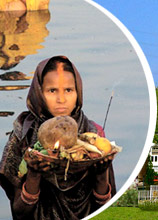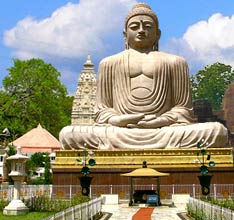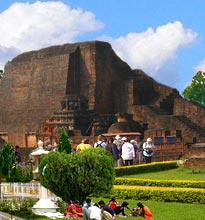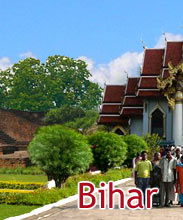Rohtas is a district in Bihar State. It has an old & interesting history. In pre-historic days the district has been inhibited by aboriginals. Rohtas was a part of the Magadh Empire since 6th B.C. to 5TH Century A.D. under Mauryans and other rulers. In the 7th Century A.D. it came under Harsha rulers of Kannauj. In the Medieval time Sher Shah Suri’s father Hassan Khan was the jagirdar of Sasaram under Jamal Khan. Consequently it came under Babur and thereafter under Sher Shah Suri. During Akbar's rule it was part of Mughal Empire. During Independence movement the district had a substantiate contribution to the freedom movement of India. After Independence Rohtas remained a part of the Shahabad District but in 1972 Rohtas became a separate District.
According to local legends the name Sasaram (H.Q. of Rohtas dist) has been derived from Sahasrabahu, a king and Parsuram, a saint who had a terrible fight in which, Sahasrabahu was killed. Another legend connects the Rohtas to Rohitashwa, son of Raja Harishchandra, a famous king who was known for his piety and truthfulness.
Located between 24" - 25" N latitude and 83" E longitude Rohtas district has an area of about 3850 Sq.Kms and lies at a height of 108 m from the sea level. It is bounded by Bhojpur, Buxar, Plamu, Garwah, Aurangabad, Gaya and Kaimur dist. Geographically it comprises the plateau of Kaimur and drained by Sone river. Climatically it is quite hot during summer (Avg. 40C) but fairly cool during winter. It gets average rainfall (Avg. 95 cm) mostly from south-west monsoon. According to 2001 census it has a population of 24.50 lakhs with a density of 636 persons per km˛. The main spoken language is Bhojpuri.
Rohtas is a major tourist destination in Bihar. The district has many historical and religious sites. Some famous among them are given below.
Rohtasgarh
The fortress of Rohtas is 38 Kms away from Sasaram was named after the prince Rohitashva. Rangmahal, Shish Mahal, Phool Mahal, are the chief attraction inside the fort area.
Shergarh Fort
The village is situated 13 kilometers south of chenari. It was a military cantonment during the regime of Sher Shah. It has a ruin of fortress.
Sher Shah Mausoleum
The great mausoleum of Sher Shah is situated in Sasaram town. This beautiful and impressive structure was built towards the middle of the 16th century.
Chaurasan Mandir
It is 1km away from Rohtas Fort and known Lord Shiva temple locally known as the Chaurasan Mandir.
Tomb of Chandan Shaheed
This is situated on the summit of Chandan Shaheed Hill. There is an old mosque constructed during the reign of Jehangir.
Ashokan Inscription and Rock-cut Cave
It is at Chand-tan-pir on Chandan Shaheed hill near Sasaram. There is a small rock-cut-cave locally called as chirag-dan near the top of the hill. Inside the cave there is an inscription in 8 lines of archaic Brahmi characters.
Tara Chandi Hill
Situated about 1-km from Chandan Shaheed hill is known for a temple having image of the goddess Tara-Chandi.
Dhurwan Kund & Gupta Dham/ Gupteshwar
Situated in the Chenari Block of Rohtas District is famous for the temple of Gupta Mahadev is situated in the caves Kaimur hills.
Tomb of Hasan Khan Sur
The old tomb of Hasan Khan Sur, father of Sher Shah is situated in the heart of the Sasaram town.
Deo Markandeya
The village situated north of Nasirganj in Sasaram on an ancient mound. This place is famous for temples of Lord Vishnu and Sun.
Bhaluni Dham
There is a temple of Parvati at Bhaluni village near Bikramganj sub division of Rohtas district.
Akbarpur
It is situated at the foot of Kaimur hills 5kms form Rohtas Fort. It contains the tomb of Malik Wishal Khan.










